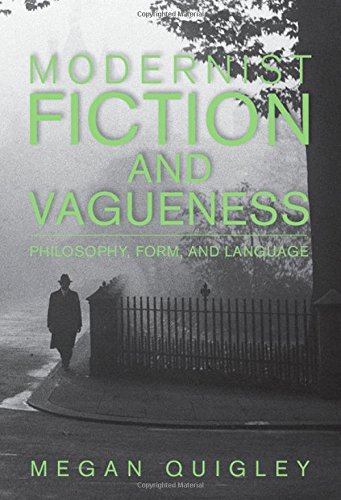Modern Fiction and Vagueness

I am very excited to read Quigley (2015), which is the rare work of an English professor that engages with contemporary philosophy of language. Here is the book description:
Modernist Fiction and Vagueness marries the artistic and philosophical versions of vagueness, linking the development of literary modernism to changes in philosophy. This book argues that the problem of vagueness - language’s unavoidable imprecision - led to transformations in both fiction and philosophy in the early twentieth century. Both twentieth-century philosophers and their literary counterparts (including James, Eliot, Woolf, and Joyce) were fascinated by the vagueness of words and the dream of creating a perfectly precise language. Building on recent interest in the connections between analytic philosophy, pragmatism, and modern literature, Modernist Fiction and Vagueness demonstrates that vagueness should be read not as an artistic problem but as a defining quality of modernist fiction.
I’ve always thought that fiction could shed light on philosophy, and vice versa. Though contemporary philosophers are not the biggest fan of fictional examples. At the same time as I discovered the Quigley book, I also came across Fisher (2025), which defends the use of fictional examples in philosophy. The abstract:
This paper provides a novel defence of the philosophical use of examples drawn from literature, by comparison with thought experiments and real cases. Such fictional examples, subject to certain constraints, can play a similar role to real cases in establishing the generality of a social phenomenon. Furthermore, the distinct psychological vantage point offered by literature renders it a potent resource for elucidating intricate social dynamics. This advantage of the internal insight that fictional examples can (though do not always) possess helps explain their prevalence in certain areas of philosophy, such as ethics, epistemology, and the philosophy of emotion, in which we can require a more precise characterization of a subject’s mental states. While the respective advantages of fictional examples, real cases, and thought experiments clearly depend on many contextual factors, the former have an important, and arguably underappreciated, role to play in philosophical inquiry.
These works are part of my late spring, early summer reading list. I recommend taking a look at them.